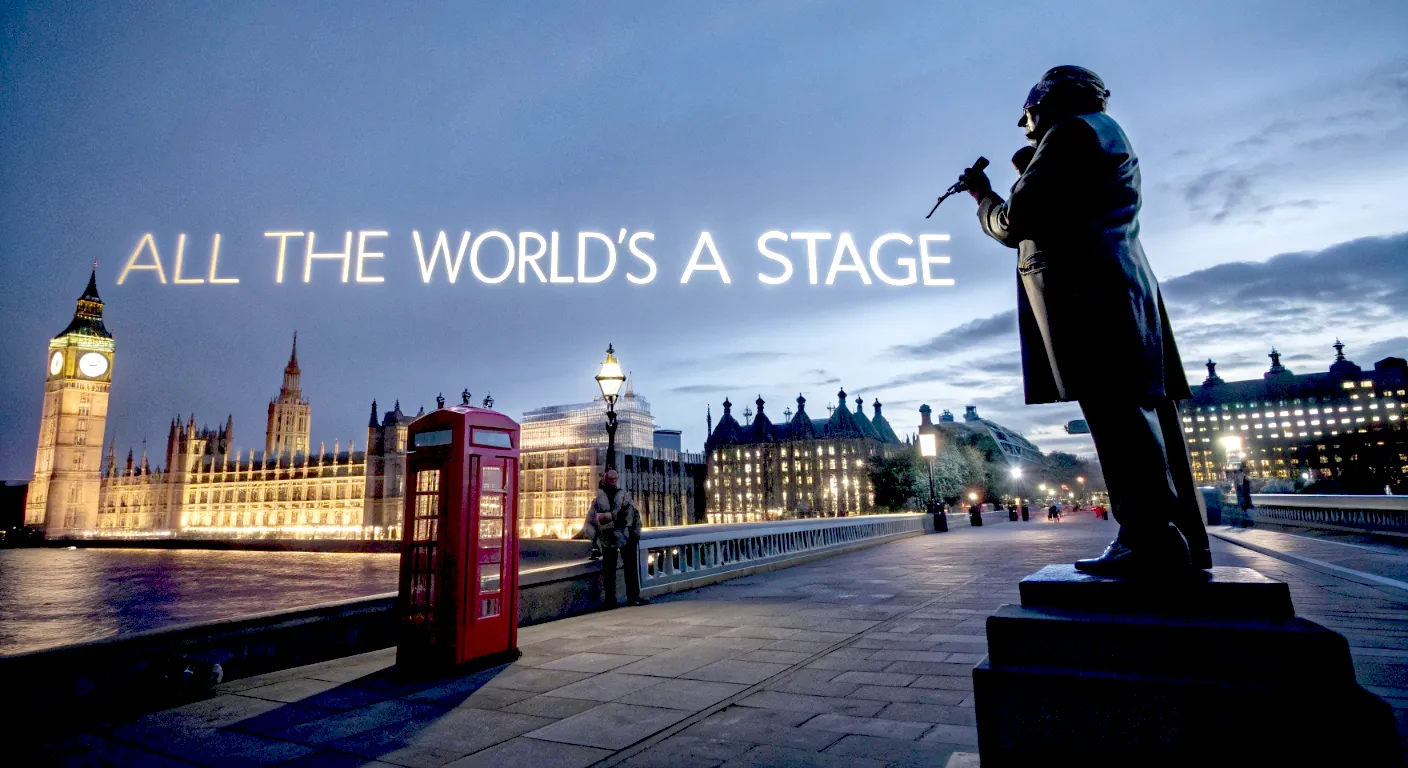The Guide to Memorable Quotes: Words that Shaped Britain and the World
Your ultimate guide to the most famous and memorable quotes. From Churchill and Shakespeare to James Bond, explore the stories behind the words that shaped Britain.

This post may contain affiliate links. If you make a purchase through these links, we may earn a commission at no additional cost to you.
Ever had a phrase just pop into your head? A line from a film you saw years ago, or something a politician said that just… stuck? Think of Winston Churchill’s deep growl promising, “We shall fight on the beaches…” Even now, decades later, those words can send a shiver down your spine. They’re more than just words; they’re a feeling, a moment in history wrapped up in a single sentence.
But why those words? Why not the sentence before or after?
Welcome to the ultimate guide to memorable quotes. We’re going on a journey to uncover the secret magic that turns ordinary words into unforgettable legends. We’ll explore the brilliant, the brave, and the downright hilarious things that Brits have said throughout history. From Shakespeare’s stage to the halls of Parliament, from the silver screen to the telly in your living room, we’ll discover the quotes that shaped a nation and found a home in the hearts of millions. So, grab a cuppa, get comfy, and let’s dive into the stories behind the soundbites.
The Secret Recipe: What Makes a Quote Unforgettable?
You don’t need to be a brain surgeon to figure out what makes a quote stick. It’s a bit like baking a brilliant cake – you need the right ingredients mixed together in just the right way. A memorable quote isn’t just about what it says, but how it says it.
Let’s break down the recipe for a truly unforgettable line.
It’s Short and Snappy
The best quotes are often short, sweet, and to the point. They’re easy to remember and even easier to repeat. Think of them like the chorus of a catchy pop song. You hear it once, and it’s stuck in your head for the rest of the day. William Shakespeare was the absolute master of this. When he had his character Hamlet ask, “To be, or not to be: that is the question,” he boiled down one of life’s biggest, scariest questions into just ten simple words. It’s so powerful and punchy that we still use it over 400 years later.
It’s Packed with Emotion
Words have power, especially when they tap into feelings we all understand. The most memorable quotes often connect with us on a deep, emotional level. They speak to our shared experiences of love, loss, joy, fear, and hope.
When Queen Elizabeth II addressed the world after the 9/11 attacks, she offered a line of comfort that resonated with everyone who had ever lost someone. She said, “Grief is the price we pay for love.” In just seven words, she captured a profound and painful truth. It’s a quote that doesn’t just make you think; it makes you feel. And that’s a powerful thing.
It Rings True
Some quotes stick around because they state a simple, universal truth so perfectly that you can’t help but nod along. They put into words a thought or feeling you’ve had but could never quite express yourself.
Jane Austen’s opening line to Pride and Prejudice is a perfect example. “It is a truth universally acknowledged, that a single man in possession of a good fortune, must be in want of a wife.” On the surface, it’s a funny observation about society in her time. But underneath, it’s a clever comment on money, marriage, and what people expect from one another. It feels true, even if it’s a bit cheeky, and that’s why we remember it.
It’s Got Rhythm and Flow
The best quotes often have a poetic quality. They use clever tricks like rhythm, repetition, or alliteration (where words starting with the same sound are used close together) to make them sound pleasing to the ear. This makes them more satisfying to say and easier to lodge in our memory.
Charles Dickens began his epic novel A Tale of Two Cities with one of the most famous lines in literature: “It was the best of times, it was the worst of times…” The perfectly balanced, repetitive structure creates a rhythm that draws you in immediately. It’s like a drumbeat that sets the stage for the dramatic story to come.
It’s Clever and Witty
A bit of wit goes a long way. Quotes that make us laugh, or at least crack a smile, have a special kind of sticking power. A clever turn of phrase or a sharp, funny observation surprises our brains and makes the words more memorable. The Irish writer Oscar Wilde was a genius of wit. His line, “I can resist everything except temptation,” is a brilliant little paradox. It’s playful, clever, and reveals a very human truth with a twinkle in its eye. It’s the kind of line you wish you’d thought of yourself.
Words That Forged a Nation: Great British Historical Quotes
History isn’t just a collection of dates and events; it’s a story told through the words of the people who lived it. In Britain’s biggest moments—times of war, discovery, and debate—a few powerful phrases have risen above the noise to define an era. These are the words that rallied armies, challenged ideas, and shaped the course of the nation.
In the Corridors of Power and on the Battlefield
When leaders speak, their words can change the world. In Britain, a long line of monarchs and prime ministers have delivered speeches that have become legendary, often in the face of incredible danger.
- Queen Elizabeth I (1588): Picture the scene. The mighty Spanish Armada, a fleet of 130 warships, is sailing to invade England. The nation is terrified. Queen Elizabeth I, dressed in armour, rides out to speak to her troops at Tilbury. She knows some doubt her ability to lead because she is a woman. She faces them and declares: “I know I have the body of a weak and feeble woman; but I have the heart and stomach of a king, and of a king of England too.” With those words, she didn’t just inspire her soldiers; she defined herself as a powerful and fearless leader.
- Oliver Cromwell (1650): Not all powerful quotes are about war. Sometimes, they’re a plea for reason. Oliver Cromwell, a key figure in the English Civil War, was frustrated with the Church of Scotland. He wrote them a letter urging them to reconsider their position, and in it, he used a line that has become a timeless call for humility: “I beseech you, in the bowels of Christ, think it possible you may be mistaken.” It’s a passionate, almost desperate, request for people to question their own certainty.
- Winston Churchill (1940): In the summer of 1940, Britain was on its knees. Nazi Germany had swept across Europe, and an invasion of the UK seemed imminent. As the new Prime Minister, Winston Churchill stood before the House of Commons and gave a speech that became the nation’s roar of defiance. He promised that Britain would never surrender, finishing with the immortal lines: “We shall fight on the beaches, we shall fight on the landing grounds, we shall fight in the fields and in the streets, we shall fight in the hills; we shall never surrender.” It was a promise of total resistance, a bulldog growl that stiffened the spine of a nation.
- Margaret Thatcher (1980): Fast forward forty years. Britain’s first female Prime Minister, Margaret Thatcher, was facing intense pressure to reverse her controversial economic policies. Unemployment was soaring, and many in her own party were losing their nerve. At the Conservative Party Conference, she faced her critics head-on. Referencing a popular phrase ‘U-turn’, she defiantly told the hall: “You turn if you want to. The lady’s not for turning.” The line perfectly captured her tough, uncompromising style and became the defining slogan of her time in power.
Quotes from Britain’s Brightest Minds
Britain has also produced some of the world’s most revolutionary thinkers. These scientists and innovators gave us words that remind us of the power of curiosity and the importance of sharing knowledge.
- Sir Isaac Newton (1675): As the man who figured out gravity and the laws of motion, Isaac Newton is one of the greatest scientific minds in history. Yet, he was remarkably humble about his own achievements. In a letter to a fellow scientist, he wrote the beautiful phrase: “If I have seen further it is by standing on the shoulders of Giants.” He was acknowledging that his own breakthroughs were only possible because of the discoveries made by the great thinkers who came before him. It’s a perfect expression of scientific progress.
- Charles Darwin (1859): Charles Darwin didn’t really have one single, snappy quote that summed up his work. Instead, his entire book, On the Origin of Species, introduced a world-changing idea: that all life on Earth is connected and has evolved over millions of years through a process called natural selection. This concept—that life changes and adapts—was a revolution. It’s an idea so powerful it doesn’t need a catchphrase.
- Sir Tim Berners-Lee (1990s): Where would we be without the internet? A British computer scientist named Tim Berners-Lee invented the World Wide Web, the system we use to browse websites. He could have made a fortune from his invention, but he chose to give it to the world for free. When asked why, he explained his guiding principle with a simple, powerful phrase: “This is for everyone.” Those four words ensured that the web would be an open, shared space for all of humanity.
From the Quill to the Keyboard: Unforgettable Lines from British Literature
The stories we tell ourselves matter. In Britain, a rich history of literature has given us characters, worlds, and, most importantly, quotes that have become part of our cultural DNA. These lines are so famous that we often use them without even remembering where they came from. They are the words that help us make sense of love, life, and everything in between.
The Bard: William Shakespeare
If British literature had a king, it would be William Shakespeare. No other writer has given us so many memorable phrases. His words are woven into the fabric of our language, popping up everywhere from movie titles to everyday conversations.
- “To be, or not to be: that is the question.” (Hamlet): This is probably the most famous quote in all of English literature. Spoken by the tormented Prince Hamlet, it’s a gut-wrenching meditation on life and death. He’s asking a simple but huge question: is it better to live with all its pain, or to end it all? It captures a moment of deep, human despair that everyone can understand.
- “All the world’s a stage, And all the men and women merely players.” (As You Like It): This is a beautiful and philosophical way of looking at life. Shakespeare suggests that we are all actors playing different parts—a child, a lover, a soldier, a parent—as we move through the story of our lives. It’s a comforting thought in a way, suggesting that our struggles are just one act in a much larger play.
- “A horse! a horse! my kingdom for a horse!” (Richard III): Have you ever been so desperate for something that you’d trade everything you have for it? That’s the feeling captured in this frantic cry. The villainous King Richard is on the battlefield, his horse has been killed, and he’s about to be defeated. In that moment, his entire kingdom is worthless compared to the one thing that could save him: a horse. It’s the ultimate cry of desperation.
The Great Storytellers
Shakespeare may be the king, but he is surrounded by a court of brilliant writers whose words have also stood the test of time.
- Jane Austen (1813): The opening of Pride and Prejudice is a masterclass in sharp, witty writing: “It is a truth universally acknowledged, that a single man in possession of a good fortune, must be in want of a wife.” It’s a sly, satirical jab at the society of her day, where marriage was often more about money than love. It sets the tone for the entire novel and is one of the most celebrated first lines ever written.
- Charles Dickens (1838 & 1859): Charles Dickens had a knack for creating scenes and characters that you never forget. In Oliver Twist, the poor, starving orphan boy Oliver walks up to the cruel master of the workhouse and bravely asks, “Please, sir, I want some more.” It’s a heartbreaking plea for basic human kindness. And with A Tale of Two Cities, Dickens gave us an opening that perfectly captures a world turned upside down by revolution: “It was the best of times, it was the worst of times…”
- George Orwell (1949 & 1945): George Orwell wrote two of the most important books of the 20th century, and both gave us chilling phrases that feel more relevant than ever. From the dystopian world of Nineteen Eighty-Four, we get the menacing warning: “Big Brother is watching you.” It’s become a shorthand for government surveillance and the loss of privacy. And from his political fairytale Animal Farm, came the cynical and brilliant line: “All animals are equal, but some are more equal than others.” It perfectly exposes the hypocrisy of systems where some people get special treatment.
Modern Magic
The magic of British storytelling didn’t end with Orwell. More recent writers have continued the tradition, creating quotes that have captured the imagination of a new generation.
- J.K. Rowling (1997): The Harry Potter series is filled with wisdom, but one of Albus Dumbledore’s earliest pieces of advice to Harry remains one of the most powerful: “It does not do to dwell on dreams and forget to live.” It’s a gentle but firm reminder to find a balance between our ambitions for the future and the reality of the present.
- C.S. Lewis (1950): A friend of J.R.R. Tolkien, C.S. Lewis created his own magical world in The Chronicles of Narnia. He filled his books with warmth and insight, including this lovely thought about the enduring power of stories: “Some day you will be old enough to start reading fairy tales again.” It’s a beautiful reminder that we’re never too old for a bit of magic.
From the Silver Screen to the Telly: Iconic Quotes from British Film & TV
It’s not just books and speeches that give us memorable words. For the last century, some of our most beloved quotes have come from the flickering lights of the cinema and the warm glow of the television. These are the lines we quote to our mates down the pub, the catchphrases that become national in-jokes, and the romantic declarations that make our hearts flutter.
Classic British Cinema
British films have a unique charm, whether they’re thrilling spy adventures, cheeky comedies, or gritty dramas. And they’ve given us some truly golden lines.
- James Bond (1962): He’s the world’s most famous spy, and his introduction is just as iconic. In his first film, Dr. No, Sean Connery lights a cigarette at a card table, and a woman asks his name. The effortless, cool reply? “The name’s Bond. James Bond.” It’s smooth, it’s stylish, and it’s become the most famous character introduction in movie history.
- The Italian Job (1969): This classic British heist film is packed with brilliant moments, but one line stands above the rest. Michael Caine’s character, Charlie Croker, is running a test for a job and things go a bit wrong with the explosives. His frustrated outburst has become a legendary bit of movie dialogue: “You’re only supposed to blow the bloody doors off!” It’s a perfectly British reaction to chaos.
- Monty Python and the Holy Grail (1975): The Monty Python comedy team were masters of the absurd, and their take on the legend of King Arthur is a cult classic. In one famous scene, King Arthur fights the Black Knight, chopping off his arms and legs one by one. But the knight refuses to give up. After losing an arm, he dismisses it with the classic line: “‘Tis but a scratch.” It’s the ultimate example of British understatement and the stiff upper lip, taken to a ridiculous extreme.
Modern British Favourites
More recent British films have continued the tradition, giving us quotes that are funny, romantic, and deeply relatable.
- Four Weddings and a Funeral (1994): This film, written by Richard Curtis, reinvented the British romantic comedy. In the final scene, Hugh Grant’s awkward but charming character, Charles, finally confesses his love to Andie MacDowell’s Carrie in the pouring rain. She asks him a simple question, and his reply is pure movie magic: “Is it still raining? I hadn’t noticed.” It’s hopelessly romantic.
- Love Actually (2003): Richard Curtis struck gold again with this beloved Christmas film. In one of the most famous (and most parodied) scenes, Andrew Lincoln’s character Mark shows up at Keira Knightley’s door to declare his love silently using a series of large cards. The final card says it all: “To me, you are perfect.” It’s a sweet, heartfelt, and unforgettable declaration of love.
The Best of the Box
British television has produced some of the best-loved comedy in the world, and with it, a host of catchphrases that are now part of the national conversation.
- Fawlty Towers (1975): John Cleese’s portrayal of the neurotic hotel manager Basil Fawlty is a comedy masterpiece. In one classic episode, Basil has some German guests staying at the hotel and becomes obsessed with not upsetting them. He repeatedly tells his staff, “Don’t mention the war!”—while, of course, mentioning it himself at every opportunity.
- Only Fools and Horses (1981): For decades, this was Britain’s favourite sitcom. It followed the hilarious misadventures of the Trotter brothers, Del Boy and Rodney, who were always dreaming of getting rich. Del Boy’s eternal, optimistic catchphrase summed up their ambition perfectly: “This time next year we’ll be millionaires!”
- Doctor Who (2007): This iconic British sci-fi show has been running for over 60 years. Each incarnation of the Doctor has their own unique personality and way of speaking. When David Tennant’s Tenth Doctor tried to explain the complex nature of time, he came up with a brilliantly silly and yet somehow perfect description: “People assume that time is a strict progression of cause to effect, but actually from a non-linear, non-subjective viewpoint – it’s more like a big ball of wibbly-wobbly, timey-wimey… stuff.”
The Art of the Zinger: The Wittiest Quotes from Britain
There’s a special place in our hearts for quotes that make us laugh. A perfectly timed, clever remark—a zinger—is a thing of beauty. British humour is famous for being dry, sharp, and wonderfully sarcastic, and our writers, wits, and politicians have produced some of the best one-liners in the business.
The Master of Wit: Oscar Wilde
When it comes to witty quotes, Oscar Wilde is in a league of his own. The Irish playwright and poet was a celebrity in Victorian London, famous for his flamboyant style and his razor-sharp mind. His plays and essays are overflowing with brilliant observations that are as funny today as they were over a century ago.
- “I can resist everything except temptation.” This is classic Wilde. It’s a paradox that sounds silly at first, but it cleverly points out a very human weakness. We all know we should resist temptation, but it’s often too much fun not to.
- “To lose one parent, Mr Worthing, may be regarded as a misfortune; to lose both looks like carelessness.” Spoken by the formidable Lady Bracknell in his play The Importance of Being Earnest, this line is a masterpiece of dry, absurd humour. She takes a truly tragic situation and treats it as a minor social blunder. It’s hilariously out of touch and utterly unforgettable.
The Political Powerhouse: Winston Churchill’s Humour
We remember Winston Churchill for his stirring wartime speeches, but he also had a wicked sense of humour and was famous for his quick-witted comebacks. He could shut down an opponent with a single, devastating line.
One of the most famous stories involves a clash with a female politician (sometimes said to be Labour MP Bessie Braddock, other times Lady Astor). The story goes that she told him, “Sir, you are drunk.” Without missing a beat, Churchill is said to have replied: “And you, madam, are ugly. But I shall be sober in the morning.” It’s a brutal, but brilliantly clever, retort.
Modern Mirth
The tradition of British wit is alive and well. Our comedians, writers, and television shows continue to produce fantastic one-liners and catchphrases. Think of the endlessly creative insults from the historical sitcom Blackadder, where Rowan Atkinson’s character Edmund Blackadder would frequently declare, “I have a cunning plan,” usually before everything went horribly wrong. It’s a phrase that has entered the language to describe a plan that is probably doomed to fail.
A Dose of Inspiration: Life Lessons from British Voices
Quotes aren’t always about making us laugh or reminding us of a dramatic moment in history. Sometimes, they offer a quiet piece of wisdom, a little nugget of truth that can inspire us, comfort us, or just make us think. These are the lines you might scribble down in a notebook or share with a friend who’s having a tough day.
- Queen Elizabeth II (2001): We’ve already seen her comforting words on grief, and her long reign was filled with moments of quiet wisdom. She was a figure of stability for so many, and her words often reflected a deep understanding of human nature.
- Virginia Woolf (1929): A pioneering writer and thinker, Virginia Woolf challenged the way people thought about society, art, and the role of women. In her essay A Room of One’s Own, she made a powerful and poignant observation about the countless women whose creativity and genius have been lost to history: “For most of history, Anonymous was a woman.” It’s a short, sharp sentence that shines a light on a huge injustice and makes you think about all the stories that have gone untold.
- A. A. Milne (1926): Sometimes, the most profound wisdom comes from the most unexpected places. In the world of Winnie-the-Pooh, created by A. A. Milne, the simple, gentle conversations between Christopher Robin and his animal friends are filled with timeless life lessons. One of the most beloved is Christopher Robin’s reassurance to Pooh: “You are braver than you believe, stronger than you seem, and smarter than you think.” It’s a perfect, pure expression of encouragement and friendship that has comforted children and adults for generations.
Handle with Care: The Danger of Misquoting
As much as we love quotes, it’s easy to get them wrong. Over time, words get twisted, meanings change, and sometimes, a quote becomes famous even though the person it’s attached to never actually said it! It’s a bit like a game of Chinese whispers that lasts for centuries.
- “Elementary, my dear Watson.” This is probably the most famous line Sherlock Holmes never said. The great detective says “Elementary” and he often says “my dear Watson,” but the two are never put together in any of Sir Arthur Conan Doyle’s original stories. The famous catchphrase was actually popularised by later stage plays and films.
- “Let them eat cake.” This quote is famously, and unfairly, attributed to Marie Antoinette, the queen of France during the revolution. The story goes that when she was told her people had no bread, she replied with this callous remark. Historians are pretty certain she never said it. The phrase actually appeared in a book written when she was just a child, long before she was queen.
It’s a good reminder to always handle quotes with a bit of care. Before you share that brilliant line on social media or use it in a speech, it’s worth doing a quick check to make sure it’s accurate. The real story is often just as interesting as the myth.
Conclusion: The Enduring Power of a Few Good Words
So, what have we learned on our journey through the world of memorable quotes? We’ve seen that a few well-chosen words can rally a nation, capture a universal truth, make us laugh until our sides hurt, or offer a shoulder to cry on.
From the battlefields of history to the pages of our favourite books, from the glitz of the cinema to the comfort of our own homes, quotes are like tiny time capsules. They preserve a moment, an idea, or an emotion, allowing it to travel through the ages and connect with new generations. They are proof that the simplest things—a handful of words arranged in just the right order—can be the most powerful things of all.
They are, as the 19th-century British Prime Minister Benjamin Disraeli once said, the way that “the wisdom of the wise, and the experience of ages, may be preserved.” And that’s something worth remembering.
Further Reading
To explore the stories and people behind these great quotes, check out these highly respected resources:
- The Churchill Museum and Cabinet War Rooms: Discover the secret underground headquarters where Winston Churchill and his government worked during World War Two. imperialwarmuseums.org.uk/churchill-war-rooms
- Shakespeare’s Globe: Visit a stunning reconstruction of the original theatre where Shakespeare’s plays were first performed and learn more about the Bard. shakespearesglobe.com
- The British Library: Home to countless literary treasures, from original Dickens manuscripts to the Magna Carta. A fantastic resource for lovers of the written word. bl.uk
- The National Archives (UK): Explore over 1,000 years of British history through original documents and records. nationalarchives.gov.uk
- Project Gutenberg: An online library of thousands of free e-books, including the full texts of many of the classic British literary works mentioned here. gutenberg.org






